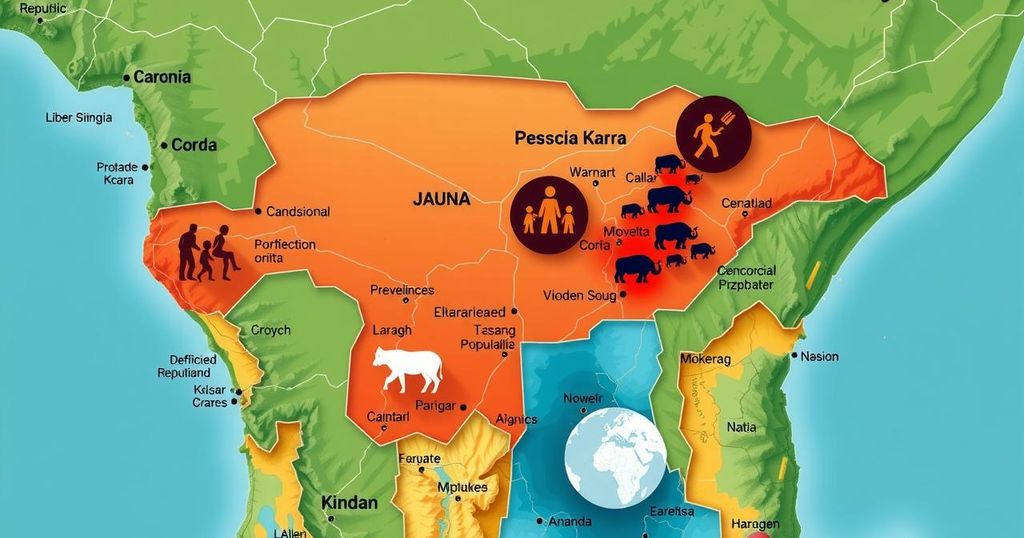World news
AFRICA, ANGOLA, AU, BUKAVU, CIVIL WAR, CNDP, CONGO (KINSHASA), DEMOCRATIC REPUBLIC OF THE CONGO, DISPLACEMENT, DR, HUMANITARIAN, KIGALI, MARCH 23 MOVEMENT, NATIONAL CONGRESS FOR THE DEFENCE OF THE PEOPLE, NORTH AMERICA, REFUGEE CRISIS, RWANDA, SEXUAL VIOLENCE, UNITED STATES, WAR
Michael Grant
0 Comments
The Humanitarian Crisis in the Democratic Republic of the Congo: A Mapping of Displacement and Violence
The DRC is currently facing a profound humanitarian crisis as violence from M23 rebels has displaced over seven million people, leading to at least 7,000 deaths in recent months. Key cities like Goma and Bukavu have fallen to M23, exacerbating the situation with severe food shortages affecting nearly 25% of the population. The international community must respond urgently to this escalating crisis.
The Democratic Republic of the Congo (DRC) is experiencing a severe humanitarian crisis primarily driven by ongoing conflict with M23 rebels. This violence has led to the displacement of millions, resulting in at least 7,000 fatalities and numerous injuries in recent months. The situation is characterized by intense instability that continues to force families to abandon their homes and seek safety elsewhere.
The armed group known as M23, formed by former Congolese soldiers of the Tutsi ethnicity, has significantly contributed to the turmoil. Initially established in 2012, the group emerged from discontent with the Congolese government’s failure to implement peace agreements from 2009. After a brief period of dormancy, M23 reasserted its presence in late 2021, intensifying military operations in eastern DRC, notably capturing key cities such as Goma and Bukavu.
This uptick in violence reached a pivotal point in January 2025 when M23 successfully took control of Goma, which serves as a crucial humanitarian hub and is home to over two million residents. Following this, M23 also captured Bukavu in February and progressed further into other areas, disregarding ceasefire agreements.
Presently, the DRC is one of the countries with the highest number of displaced individuals, with over seven million people forced from their homes. Reports indicate that nearly 780,000 people fled between November 2024 and January 2025, with substantial numbers seeking refuge in neighboring countries such as Burundi and Uganda. The UN Refugee Agency has noted that over 100,000 people have crossed into foreign territories since the onset of renewed conflict.
Furthermore, acute food insecurity affects nearly a quarter of the DRC’s 112 million population. Even before the latest conflict escalation, 21 million inhabitants required humanitarian assistance. The UN’s Office for the Coordination of Humanitarian Affairs highlighted that the crises of armed conflict, rising food prices, and epidemics have compounded the struggle, affecting millions in North Kivu, South Kivu, and Ituri provinces, all facing severe food shortages due to ongoing violence and looting of humanitarian aid resources.
The Democratic Republic of the Congo finds itself amidst a deepening humanitarian crisis due to the resurgence of violence, particularly from M23 rebels. With millions displaced and widespread food insecurity looming, the situation demands immediate attention. Efforts to stabilize the region and provide essential humanitarian aid face substantial challenges, necessitating coordinated international support to alleviate the suffering of affected populations.
Original Source: www.aljazeera.com




Post Comment